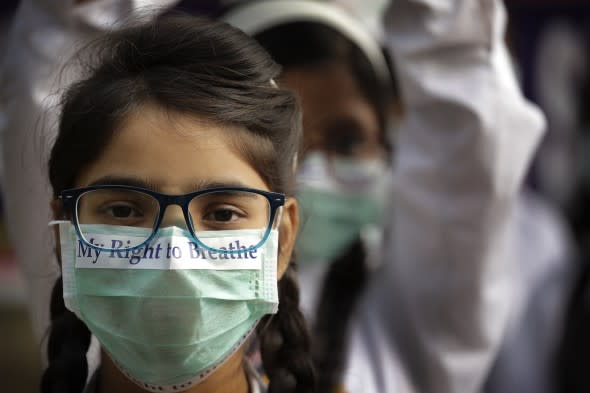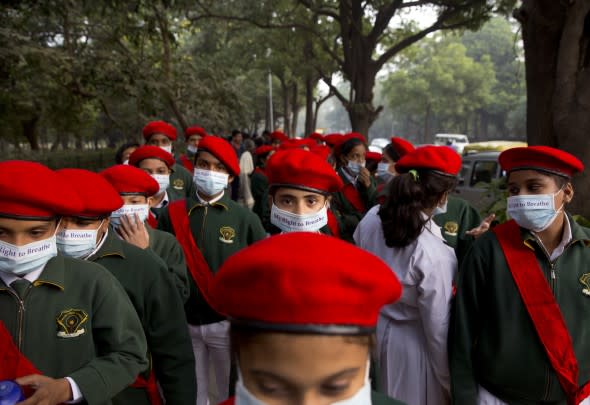Health benefits far outweigh the costs of climate change, WHO report says
The health benefits of meeting climate change goals far outweigh the costs a World Health Organization (WHO) report released on Wednesday, Dec. 5, said.
The value of health gains from climate action would be approximately double the cost of mitigation policies at a global level. And the benefit-to-cost ratio is even higher in countries like China and India, according to the latest estimates from leading experts.
"Meeting the goals of the Paris Agreement could save about a million lives a year worldwide by 2050 through reductions in air pollution alone," the report reads.
The 2015 Paris Climate Agreement is a global safeguard for human health, according to the report. It specifies that "parties should, when taking action to address climate change, respect, promote and consider their respective obligations on the right to health."
The Paris Agreement is the first climate agreement to gain strong global support, having now been ratified by 183 countries. The Climate Agreement sets clear targets: to limit global temperature rise to well below 2 C and to pursue efforts to minimize warming to no more than 1.5 C above pre-industrial levels.

School children take out march to express their distress on the alarming levels of pollution in the city, in New Delhi, India, Wednesday, Nov. 15, 2017. (AP Photo/Manish Swarup)
The recent WHO report was launched at the United Nations Climate Change Conference (COP24) in Katowice, Poland.
It highlights why health considerations are critical to the advancement of climate action and outlines key recommendations for policymakers.
The public health community has rapidly increased its engagement on climate change and health in recent years. It is working to provide a better understanding of the links between climate change and health.
WHO is working with leading health professional bodies, nongovernmental organizations, journals and the wider health community to mobilize behind stronger climate mitigation and adaptation.
The call to action on climate and health for COP24 was issued by organizations representing over 5 million doctors, nurses and public health professionals and 17,000 hospitals in over 120 countries.
Mobilization of the health sector is also necessary to reduce the growing contribution of health care to greenhouse gas emissions, which currently represents 5 to 8 percent of the total in high-income countries.
The drivers of climate change, principally fossil fuel combustion, pose a heavy burden of disease.
Exposure to air pollution associated with climate change causes 7 million deaths worldwide every year and costs an estimated US $5.11 trillion in welfare losses globally, according to WHO.
In the 15 countries that emit the most greenhouse gas emissions, the health impacts of air pollution are estimated to cost more than 4 percent of their GDP.
Meanwhile, climate actions to meet the Paris goals would cost around 1 percent of the global GDP.

School children take out a march to express their distress on the alarming levels of pollution in the city, in New Delhi, India, Wednesday, Nov. 15, 2017. The air was the worst it had been all year in New Delhi. Microscopic particles spiked to 75 times the level considered safe by the World Health Organization. (AP Photo/Manish Swarup)
"The Paris Agreement is potentially the strongest health agreement of this century," Dr. Tedros Adhanom Ghebreyesus, director-general of the WHO, said in the report.
"The evidence is clear that climate change is already having a serious impact on human lives and health. It threatens the basic elements we all need for good health - clean air, safe drinking water, nutritious food supply and safe shelter - and will undermine decades of progress in global health. We can't afford to delay action any further," he said.
The same human activities that are destabilizing the Earth's climate also contribute directly to poor health. The main driver of climate change is fossil fuel combustion, which is also a major contributor to air pollution.
"The true cost of climate change is felt in our hospitals and in our lungs. The health burden of polluting energy sources is now so high, that moving to cleaner and more sustainable choices for energy supply, transport and food systems effectively pays for itself," Dr. Maria Neira, WHO director of public health, environmental and social determinants of health, said in the report. "When health is taken into account, climate change mitigation is an opportunity, not a cost."
Switching to low-carbon energy sources will not only improve air quality but provide additional opportunities for immediate health benefits.
For example, introducing active transport options such as cycling will help increase physical activity that can help prevent diseases like diabetes, cancer and heart disease.
The report calls for countries to account for health in all cost-benefit analyses of climate change mitigation.
It also recommends that countries use fiscal incentives, such as carbon pricing and energy subsidies, to create incentives for businesses to reduce their emissions of greenhouse gases and air pollutants.
